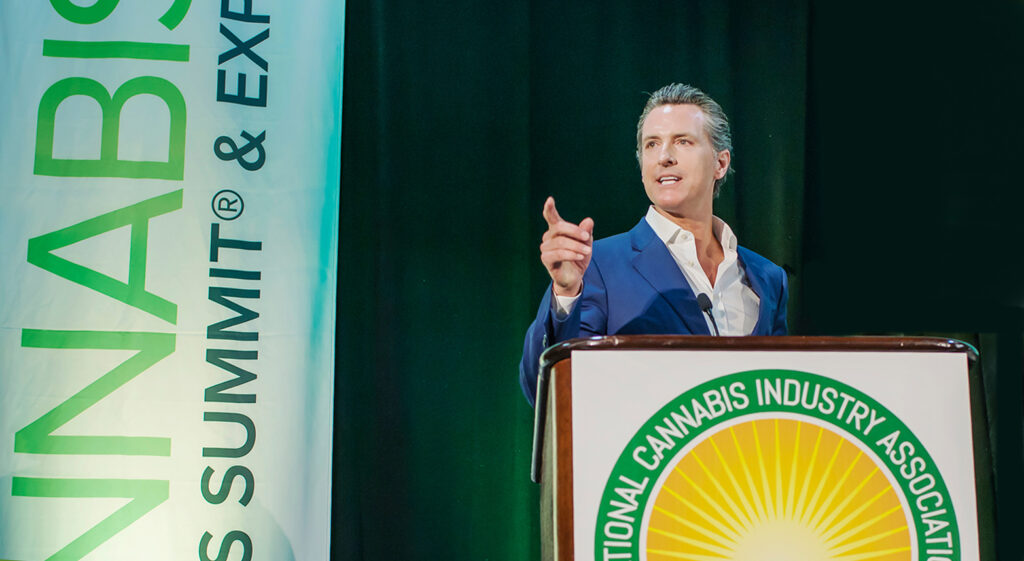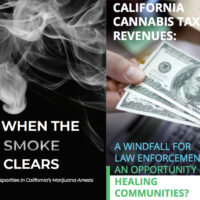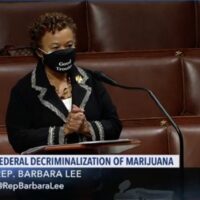
It’s unlikely that any possible replacement candidate will be as favorably attentive to cannabis policy as Governor Newsom. For that reason, California NORML recommends voting NO on the gubernatorial recall and encourages cannabis supporters to make sure you are registered to vote, and do vote against the recall in the election.
The sponsors of this year’s recall election are no friends of marijuana or criminal justice reform. Whatever else might be said about Gavin Newsom, no governor has been so supportive of legal marijuana.
When other politicians were ducking the issue, then-Lieutenant Governor Newsom became the highest-ranking state official to endorse legal adult use and established a task force to help guide the way. Since becoming governor, Newsom has appointed capable, helpful officials who have been accessible to cannabis advocates. The Newsom administration has advanced measures to expand on-site consumption and licensed cannabis events; promote equity applicants; afford business tax deductions; allow billboard advertising; and improve and streamline the state’s burdensome regulatory system.
To be sure, Newsom hasn’t been perfect. He has been criticized for not pushing hard enough to reduce burdensome taxes and regulations, and for being a stickler for anti-smoking rules that wrongly treat cannabis like tobacco. But his hands have also been tied by the legislature, federal laws, and California’s overly restrictive Prop. 64 initiative.
Above all, Newsom deserves credit for declaring cannabis to be an essential service during the COVID crisis, a move mocked by critics and recall proponents. He also approved emergency rules to allow drive-through and curbside pick-ups of cannabis, to extend the expiration date for medical IDs and recommendations, and to allow for donations of cannabis to needy patients by cannabis businesses.
QUESTION 2 (UPDATED Aug. 29)
In addition to voting on the recall, voters may choose a candidate to replace Newsom if he loses. If the recall succeeds, any of the 46 opposing candidates that gets a plurality, even as small as 20% by some predictions, could take the Governorship, although whoever wins will have to face re-election next year. For voters concerned about marijuana and drug policy who wish to vote on Question 2, here is a rundown of replacement candidates’ views.
DEMOCRATS
There are no Democrats with previous experience as office-holders running in the recall.
Democratic candidate Jacqueline McGowan boasts experience as a cannabis advocate. An avowed medical cannabis patient, McGowan has actively lobbied local governments for common-sense regulations and permitting since 2014. McGowan is highly critical of Prop. 64 for over-regulating and taxing the industry and generally supports more access for all adults, especially patients. While her major campaign issue is cannabis, she has added platform positions on criminal justice, housing & homelessness, fire, water, and COVID to her website.
Moderate Democrat Kevin Paffrath, a real estate investor and financial advisor with a large YouTube following, has emerged as a possible contender in one poll. Paffrath is one of the few candidates to mention cannabis on his website, criticizing the state’s inept efforts to stem the illegal market: “80% of cannabis sold in California is illegal… [Illegal farms] pollute our ground water & steal water from fire hydrants. California’s solution? REMOVE 100 fire hydrants in an area relying on them for fire prevention. The Governor has not led the effort to ‘decriminalized’ marijuana, he’s encouraged illegal farming and poor leadership in getting legal business licenses.”
REPUBLICANS
San Diego ex-Mayor Kevin Faulconer stayed at arm’s length while the city council moved early on to approve licensed cannabis businesses. Some advocates describe his position as one of “benign neglect,” neither obstructing nor embracing cannabis. However, others complain that he was unresponsive to their inquiries and made snide comments about pot. Faulconer is touted as the Republican moderate in the race for his liberal positions on abortion and climate change. However, in a TV debate, he blasted his leading opponent, Larry Elder, as “unfit” to serve as governor for favoring legalization of recreational drugs.
Talk-show host Larry Elder is a right-wing conservative with libertarian leanings on drugs. He has also taken heat for his controversial positions against vaccinations and mask mandates, the minimum wage, abortion, and climate change, and for writing that women “know less than men” about the issues. On a 2012 show, Elder called it a “mind blower” that marijuana was still illegal in a country with gay marriage and legal abortion. He criticized the federal government for wrongly classifying marijuana as an addictive drug with no medical use; blasted the LA City Council for voting to ban pot dispensaries; and took Santa Monica to task for making it illegal for consenting adults to smoke cigarettes in their own apartment. Elder denounced the war on drugs for aggravating criminality, calling drug use a health, not criminal justice problem. On the other hand, Elder was also accused by his ex-fiancee of brandishing a gun at her while high on marijuana. Like Trump, whom he supports, Elder refused to fully disclose his tax returns, but was allowed on the ballot anyhow.
Hip-hop musician Nickolas Wildstar describes himself as a “Black Sheep Libertarian.” He is also a medical cannabis patient who used to enjoy good medicine under Prop.. 215. He complains he can no longer do so in the for-profit, regulated regime established by Prop 64. He claims Prop. 64 is illegal and proposes introducing legislation (a “Peron Act”) to remedy the situation. He would cease all future licensing of commercial “for profit” cannabis licenses.
Businessman John Cox, who has been parading around California with a faux grizzly bear, is out of touch with a state where grizzlies are extinct. In his losing campaign against Newsom in 2018, Cox put his foot in his mouth by suggesting that marijuana users be hospitalized to cure them of substance abuse. He then backtracked by saying he’s “certainly for medical marijuana” and “not necessarily demanding” hospitalization for cannabis users. A devout Catholic, Cox is known for conservative views on social issues.
Olympic athlete Caitlyn Jenner has had little to say in her vague campaign. Jenner was outraged on camera in 2014 when her then-wife Kris shared an edible with her mother on Keeping Up With the Kardashians. “I won’t have it in this house,” said Jenner.
Board of Equalization Member Ted Gaines, who is campaigning against burdensome taxes and regulations, posted a long, miserable voting record against marijuana and drug reform in his dozen years in the state legislature (2007-2019). Now he is running against Prop 47, which de-incarcerated nonviolent drug offenders.
Asm. Kevin Kiley from Granite Bay has posted a poor, conservative voting record in the legislature, opposing expansion of cannabis events, veterinary use and medical access for schoolchildren.
Former Rep. Doug Ose, a law-and-order advocate, was a strident drug warrior in Congress (1999-2005), but has withdrawn from the race due to health reasons and endorsed Kevin Kiley.
LIBERTARIANS
Riverside County Supervisor Jeff Hewitt is the official Libertarian party candidate. He styles himself as an “Old-School Californian.” As a Supervisor, he voted to roll back zoning restrictions for cannabis operations, advocating free-market competition.
GREENS
Dan Kapelovitz, a former journalist for Hustler magazine is a practicing defense attorney. He founded the Radical Law Center, focusing on defense of DUI, drug crimes, sex crimes, animal law, constitutional rights and more. His responses to Cal NORML’s candidate questionnaire reveal him to be solidly in favor of full marijuana legalization and human rights for cannabis users. He is also for lessening of burdensome regulations on cannabis, and strongly for changing federal law.
L.A. hair stylist Heather Collins, “absolutely” supports legal cannabis and would fight to have it legalized federally. She supports lower taxes and regulations in line with other comparable businesses, local control of licensed sales, and shutting down illegal shops.



